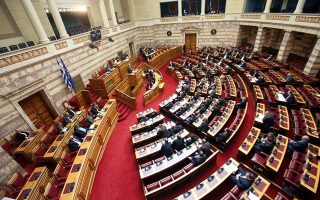Liberty and complacency

Greece has been scarred by wars, catastrophes and bankruptcies since the start of the War of Independence in 1821.
Yet, even today when we are threatened by new, groundless divisions while dangers gather around us, we can declare that we Greeks are free. One-hundred-and-ninety-seven years ago our forefathers took up the challenge of fighting for independence and liberty; our responsibility today is to defend – not waste – that freedom.
We are not the richest nor the happiest citizens in the world. The last few years, in fact, have forced us to face the unpleasant task of managing the decline of our expectations and the drop in our living standards.
But no nation enjoys greater freedom, greater equality among citizens, greater press freedom. Our greatest problems stem not from a lack of democratic principles and institutions, but from the ease with which people, from high office to the street (including all kinds of self-declared “rebels”), are indifferent to rules, undermining institutions in any way they can.
Sometimes liberty is like a fancy shop window, while behind the scenes arbitrary behavior, injustice and shortsighted personal interests hold sway.
The struggles and sacrifices which shaped the country, its political system and its people were not in vain. They granted us independence, territorial expansion, the assimilation of over a million refugees after the Catastrophe of 1922, a robust resistance against the German, Italian and Bulgarian occupation, the reconstruction of the country after World War II and the civil war, the restoration of democracy in 1974, and our accession to NATO and the European Union.
But they left another legacy, too: the ease with which we split into conflicting factions, not so much because of dead ends and despair as because division is a simple and effective political tactic.
Today, when the dangers on our diplomatic and economic fronts are such that they can undermine the achievements of decades, we face a political scene where the government and opposition parties are again divided. Responsibility for this lies mainly with the government, because it sets the political agenda – with its boasts of a so-called “moral advantage” and generalized accusations of rivals’ corruption.
The government sets up obstacles to cooperation, while at the same time preparing the narrative for the day after its possible election defeat, when it is likely to claim that it was not its policies that were to blame but that it is the victim of the “system’s” revenge against its effort to clean up politics. The fact that this story can appeal only to the very naive or to those who have an interest in believing it does not worry those who govern.
Nor are they concerned with the harm done to politics and society. The prime minister and many of his aides were born after Hellenism’s most recent tragedies – the dictatorship and the Turkish invasion of Cyprus. The “struggles” in which they came of age were, for the first time, without personal risk. In the years after the dictatorship, they were in danger of neither prison nor death, nor did they risk losing the benefits of democracy and capitalism, of participation in the European Union. They learned neither the art of compromise nor the price of rash action.
The stability and prosperity of the past decades were a sound foundation for many young men and women to move upward toward the future, pulling the country with them, step by step. Unfortunately, though, many of those who today play a role in public life, whether in government or playing at revolution in various safe havens in the social whole, are perpetually angry at what they see as endless injustice against them.
They persist with reconstructions of battles from a made-up past. This is the ultimate complacency – the irresponsibility and confusion which undermine today and tomorrow.
The real, eternal revolution is to protect and to nourish the freedom, independence and prosperity that we inherited. This is our duty.





